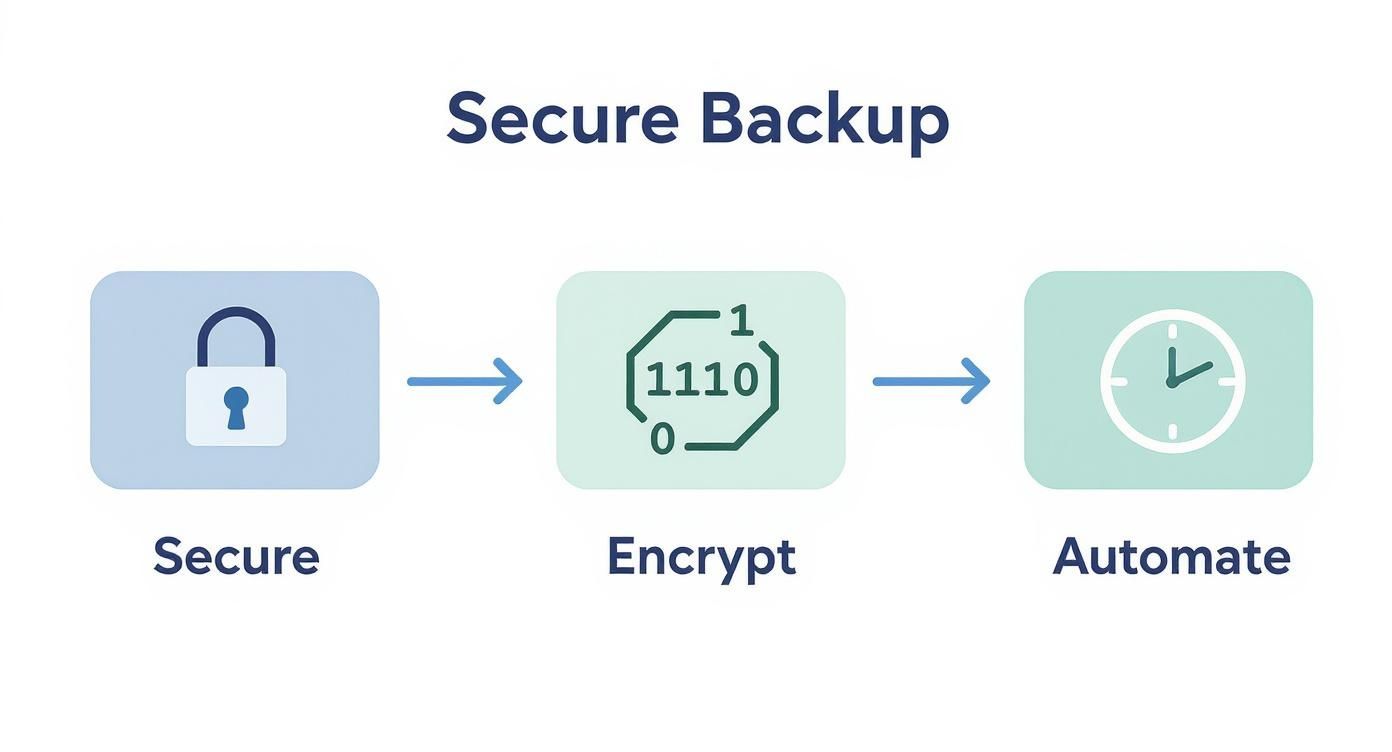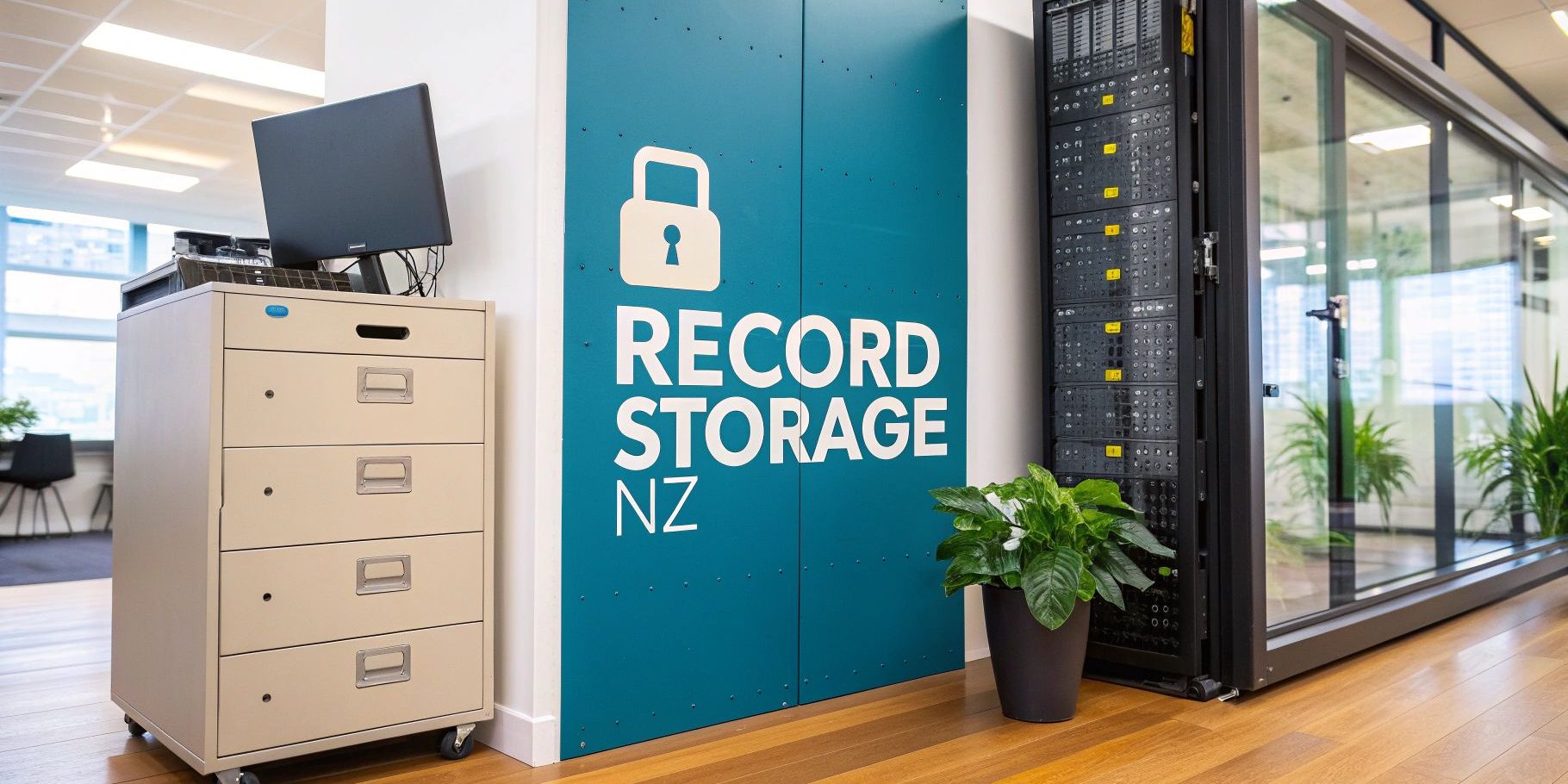When you search for "record storage NZ", you're probably looking for a secure, compliant, and reliable way to protect your business's critical data. The best options out there today offer things like automated digital backups and nationwide security from a New Zealand-based provider, giving you solid protection against data loss so your information is safe and there when you need it most.
Why Modern Record Storage Is a Business Necessity
Let's get past the image of dusty filing cabinets and overflowing server rooms. For today's Kiwi businesses, effective record storage isn’t just about hoarding paper—it’s a cornerstone of security, legal compliance, and operational resilience. Making the move from vulnerable physical files to secure, accessible digital systems isn't really a choice anymore; it's a fundamental part of doing business.

Whether you’re a local accounting firm in Christchurch or a nationwide legal practice, a smart record storage strategy is non-negotiable. A modern approach protects you from data loss, makes compliance far simpler, and ensures you can get your hands on critical information in an instant.
From Physical Risk to Digital Resilience
Let’s be honest, traditional physical storage is incredibly fragile. Paper documents can be lost to a fire, a flood, or even just get misfiled into oblivion. On-site servers face similar threats, from hardware failure and theft to environmental damage. This is exactly where a professional approach to digital record storage makes all the difference.
By moving to a secure digital system, you aren't just storing data. You're investing in your business's ability to survive and thrive through unexpected disruptions. This is the very core of true operational resilience.
Digital backups create multiple copies of your data in secure, off-site locations. This means that even if you can’t get into your main office, your records are still safe and recoverable. It's a critical piece of any effective plan for business continuity and disaster recovery. This proactive stance ensures your operations can keep ticking along with minimal interruption, no matter what happens.
Physical vs Digital Record Storage At a Glance
The difference between old-school methods and modern solutions really highlights why so many businesses are making the switch. Physical storage is cumbersome and slow, while digital options offer a level of speed, security, and accessibility that traditional methods just can't compete with.
This quick comparison shows how the two approaches really stack up.
| Feature | Physical Storage | Digital Storage |
|---|---|---|
| Accessibility | Limited to one physical location; slow retrieval. | Instant access from anywhere with an internet connection. |
| Security | Vulnerable to fire, flood, theft, and degradation. | Protected by encryption, access controls, and off-site redundancy. |
| Compliance | Difficult to track retention periods and audit trails. | Simplified with automated retention policies and clear audit logs. |
| Recovery | Often impossible to recover if the original is lost or destroyed. | Fast and reliable restoration from secure backups. |
As you can see, digital isn't just a different way to store things; it’s a smarter, safer, and more efficient way to manage your business’s most valuable asset—its information.
The Evolution of Record Keeping in New Zealand
To really get a handle on modern record storage in NZ, it helps to see how we got here. The story of keeping records in Aotearoa is a long one, starting from the early days of colonial administration and leading all the way to the complex digital archives we rely on today. This journey from paper to pixels has completely changed the game for every Kiwi business.
Our nation's drive to preserve information isn’t just a recent trend; it’s deeply rooted in our history. The first real push for organised statistical records and archives kicked off back in the 19th century, showing an early understanding of how valuable documented data was. The first official stats appeared in confidential reports called "Blue Books," put together from the late 1840s by the Colonial Secretary’s Office for officials back in London. If you're keen to go down that rabbit hole, you can learn more about the history of statistics in New Zealand.
From Ledgers to Local Servers
For generations, the good old physical ledger was the gold standard for business records. Information was painstakingly written in by hand, and these books were the single source of truth for a company's finances. Tucked away in filing cabinets or strongrooms, their safety depended entirely on a physical lock and the four walls around them.
As technology moved on, so did our methods. The first computers kicked off a wave of digital change, with businesses shifting their records from paper onto local servers. It was a massive leap forward, making it faster to find information and crunch numbers, but it also opened up a whole new can of worms. A server crash, a fire, or a simple power surge could wipe out years of critical data in a flash.
The Rise of Digital Archives and New Responsibilities
The internet era brought the next big shift. Suddenly, being able to store data off-site changed how businesses thought about disaster recovery. Instead of putting all their eggs in the back-office-server basket, companies could now keep copies of their data somewhere else entirely. This was the start of the cloud storage we all know today.
But this change wasn’t just about new tech; it came with serious new responsibilities for Kiwi businesses. Going digital meant protecting records was no longer just about stopping a burglar or a fire. Now, it was about defending data from a growing list of digital threats, from hardware failure and accidental deletion to sophisticated cyber attacks.
The move from paper to digital has transformed record storage from a passive filing job into an active, ongoing security mission. How you manage your data today directly impacts your business's compliance, reputation, and ability to even open its doors tomorrow.
Understanding this history gives us the context for the tough compliance and data laws we have in New Zealand today. Our cultural focus on preservation, mixed with the realities of a connected world, has shaped a legal framework that demands a professional, secure approach to digital storage. It's a story that connects our past with the very real, present-day need for robust and reliable record storage NZ solutions that can protect a business's most valuable asset: its information.
Navigating New Zealand's Compliance and Retention Laws
Getting your head around New Zealand's legal requirements for record storage isn't just about ticking boxes. It’s about shielding your business from some pretty serious legal and financial heat. Drop the ball on keeping the right documents for the right amount of time, and you could be looking at steep penalties, messy legal disputes, and a damaged reputation that’s hard to fix.
For most Kiwi businesses, the rules are fairly straightforward. The Companies Act 1993 and various Inland Revenue Department (IRD) regulations are the big ones, forming the backbone of what you need to do. These aren't just gentle suggestions; they're strict rules that dictate how your business must manage its information.
In New Zealand today, record storage has moved beyond dusty old company files. It now includes huge private collections and, on the government side, massive volumes of official documentation that all need regulated storage. The New Zealand Customs Service, for instance, requires businesses to follow rigorous legal standards for how long records are kept and how they're eventually disposed of. This isn't just bureaucracy; it's about making sure storage is used efficiently and everyone stays on the right side of the law.
The Seven-Year Rule and Beyond
If there's one rule you've probably heard of, it's the "seven-year rule." Think of this as the fundamental starting point for almost every business operating in New Zealand.
- Financial Records: Under tax law, you must hang on to all financial documents for at least seven years. This covers everything from invoices and receipts to bank statements, wage books, and asset registers.
- Company Records: The Companies Act also demands that core company documents are kept for a similar period, often at your registered office.
But here’s the catch: that seven-year period is just the baseline. For some industries, especially those dealing with high-stakes information, the requirements get a lot tighter and more complex. You really need to know the specific laws for your sector.
Special Focus: Accounting and Law Firms
For professional services like accounting and law, record retention is more than just an admin task—it's a core professional and ethical duty. The information you handle is incredibly sensitive and is governed by specific legislation that goes way beyond standard business practice.
For Accounting Firms:
As an accountant, you're the custodian of your clients' entire financial histories. So, beyond the standard seven-year IRD rule, you also have to think about:
- Client Engagement Letters: These documents define the scope of your work. They need to be kept for the entire time you're working with the client, plus seven years after the relationship ends.
- Working Papers: Any documents that back up audits, reviews, and financial statement preparation have to be retained to prove you’ve done your due diligence.
- GST and PAYE Records: These need to be kept meticulously. IRD audits often focus heavily on these areas, so your records have to be perfect.
For Law Firms:
Legal practices handle some of the most confidential information imaginable, all governed by the Lawyers and Conveyancers Act.
- Client Files: These must be kept for a minimum of seven years after a case is closed. Often, you'll need to keep them for much longer, especially for things like trust or property matters.
- Trust Account Records: This is an area of extreme scrutiny. All your trust account documentation must be kept for at least seven years, and flawless records are completely non-negotiable.
- Deeds and Wills: Critical original documents like these might need to be stored indefinitely or until they can be safely returned to the client.
The consequences of getting this wrong are severe. They can range from hefty fines from regulatory bodies to professional misconduct charges that could see you struck off the register. For both accountants and lawyers, failing on retention laws is a fundamental breach of professional trust.
Building a Compliant Retention Policy
Putting together a formal data retention policy is your first practical step towards getting this right. Think of it as your company's rulebook, making sure everyone on your team knows exactly what their responsibilities are. It’s a good idea to understand the general principles of good data retention policies to build a solid framework, while keeping the focus on New Zealand's specific laws.
Your policy should clearly spell out:
- What to Keep: Get specific about the types of records you must retain (e.g., invoices, client contracts, trust account statements).
- How Long to Keep It: Define the retention period for each record type, and mention the legislation that requires it (e.g., "Financial records: 7 years as per the Tax Administration Act").
- How to Store It: Detail whether records will be stored physically, digitally, or a mix of both, and what security measures are in place to protect them.
- How to Destroy It: Create a secure process for destroying records once their time is up. You can't just toss them in the bin; you need to protect that sensitive information.
A modern, robust digital record storage NZ solution makes managing these policies a whole lot easier. Automated systems can flag records when they’re ready for deletion, provide secure and instant access for audits, and ensure your data is protected from loss. It’s a smarter way to meet your legal duties with far greater efficiency and peace of mind.
Protecting Your Records from Digital Threats
In our connected world, your digital records are constantly at risk. The danger isn't just a server failing anymore; it’s about active, malicious attacks designed to cripple New Zealand businesses. The most terrifying of these is ransomware, a type of digital extortion that can lock you out of your own data, grinding your entire operation to a halt until you pay a hefty fee.

Think of your security strategy as a digital fortress with multiple layers of defence. It’s simply not enough to have a single password and hope for the best. You need a robust plan that protects your records from every angle, making sure that even if one defence is breached, your data remains safe and sound.
Building Your Digital Fortress
A solid defence starts with fundamental security practices. These aren’t optional extras; they are essential protections for any business serious about safeguarding its information. When they work together, they create a formidable barrier against cyber criminals.
Key layers of your defence should include:
- End-to-End Encryption: This scrambles your data as it travels from your network to its storage location and while it rests there. Even if a cyber criminal intercepted your files, they'd be unreadable and completely useless without the unique decryption key.
- Strict Access Controls: Not everyone in your organisation needs access to every single file. By implementing strict user permissions, you ensure employees can only view or edit records relevant to their roles. This dramatically cuts down the risk of both accidental data loss and internal threats.
- Automated, Offsite Backups: This is your ultimate safety net. Regularly and automatically backing up your data to a secure, offsite location means you always have a clean copy to restore from. In the face of a ransomware attack, you can simply wipe the infected systems and restore your clean data, bypassing the criminals entirely. To further strengthen your defences, it's worth exploring comprehensive cyber security risk management strategies.
The Power of Geographically Separate Datacentres
Having a single backup is good, but what happens if that backup location is hit by the same disaster that strikes your primary office? A fire, flood, or a major earthquake in a city like Christchurch could wipe out both your main server and your local backup in one go.
This is why true business resilience demands storing your data in secure, geographically separate datacentres within New Zealand.
Storing your data in multiple locations across the country is the ultimate safeguard. It means that no single event, whether it's a natural disaster or a targeted cyber attack, can ever result in the total loss of your critical business records.
When your record storage NZ provider uses dual datacentres—say, one in Auckland and another in Christchurch—your data is replicated across both sites. If one centre goes offline for any reason, the other is ready to take over instantly.
This level of redundancy ensures your business can continue running, no matter what happens. It offers complete peace of mind and guarantees operational continuity. On top of this, modern services also offer powerful anti-malware protection built right into the backup process, actively scanning for threats before they can be saved. This dual approach of physical separation and digital vigilance creates an almost unbreakable shield for your most important asset: your information.
How to Choose the Right Record Storage Partner
Choosing a third-party provider for your digital record storage nz is one of the more critical decisions you'll make for your business. It's not about finding the cheapest price per gigabyte; it’s about handing over your most sensitive information to a partner you can trust. This single choice has a direct line to your security, your compliance, and your ability to keep the doors open during a crisis.

To pick the right one, you have to look past the marketing slogans and start asking the tough questions. A simple checklist can help you cut through the noise and find a provider that genuinely gets your operational needs and legal duties, saving you from a very costly mistake down the road.
Key Questions for Potential Providers
Before you even think about signing a contract, you need clear, direct answers to these crucial questions. A partner worth their salt will have no problem giving you the details.
- Where is my data physically stored? This is non-negotiable. For data sovereignty and to comply with New Zealand's Privacy Act, your data absolutely must be stored within the country. Make sure their servers are in NZ datacentres, not just managed by a Kiwi company from afar.
- What are your security certifications? Look for internationally recognised standards. These aren't just badges; they're proof from a third party that the provider is serious about robust security.
- What does your disaster recovery plan look like? Ask about their own backup procedures. Do they have geographically separate datacentres? A provider based in Christchurch, for example, really ought to have a secondary site in another city to guard against earthquakes or regional power cuts.
- How flexible are your data retention policies? You need a solution that bends to your specific legal needs, whether that’s the standard seven-year rule for tax records or much longer periods for legal files.
This data management challenge isn't just a private sector headache. Even our national institutions are feeling the pressure. Archives New Zealand has openly talked about its own struggles with storage capacity, highlighting that the explosion of digital files has created "digital landfills" that strain their ability to manage everything. When you're picking a partner, it's worth a look at the challenges of government recordkeeping to understand just how important scalable, well-managed systems are.
Features That Truly Matter
Once you’ve covered the security basics, the right partner should offer features that genuinely make your life easier and your business safer.
A great record storage solution should work quietly and reliably in the background. It gives you the confidence to focus on your actual business, knowing your data is protected automatically and can be restored in minutes, not days.
Keep an eye out for these practical features:
- Automated Backup Schedules: Let's be honest, manual backups get forgotten. An automated system makes sure your data is backed up consistently without anyone having to remember to do it.
- Simple Setup and Recovery: The initial setup should be a piece of cake, and restoring files needs to be fast and intuitive. Complicated processes just create friction and add to the downtime when you're in a jam.
- Nationwide Security: A provider should be able to offer solid security and backup services to businesses right across New Zealand, not just in their home city.
Making a Confident Choice with Backup NZ
At Backup NZ, we built our entire service to give Kiwi businesses solid answers to these critical questions. Based right here in Christchurch, New Zealand, we provide nationwide backup and security. Our straightforward pricing and powerful features are all designed to give you complete peace of mind.
Our plans are built for businesses of all sizes:
- Business 10: $30 per month
- Business 20: $50 per month
- Business 50: $100 per month
- Business 100: $150 per month
We'd rather show you than just tell you. You can take our full suite of features for a spin and see just how easily our system fits into your workflow by starting a no-obligation 14-day trial.
Your Secure New Zealand Based Backup Solution
After wading through the complexities of legal compliance and ever-present digital threats, the next question is simple: what’s the solution? For Kiwi businesses, it’s not just about finding any backup service. It’s about finding a partner who genuinely understands our local landscape, from the nuances of the Privacy Act to the practical realities of running a business here.
That’s exactly why we built Backup NZ. We’re a Christchurch-based company, proudly providing nationwide backup and security services. This isn’t some generic, one-size-fits-all product rebadged for the local market. Our entire system was designed from the ground up with the unique needs of New Zealand businesses in mind.
A Solution Built for New Zealand Businesses
We got tired of seeing Kiwi businesses struggle with overseas solutions that didn't quite fit. So, we tackled the big issues head-on with a complete, automated system designed to protect your most valuable asset—your data.
Our mission is pretty simple: to give you total peace of mind through technology that’s powerful, but not complicated.
Here’s how we make it happen:
- Automated Backups: Let's be honest, manual backups get forgotten. Our system takes human error out of the equation, automatically backing up your data on a schedule that works for you. You’ll always have a recent, clean copy ready to go.
- Military-Grade Encryption: Your data is locked down tight, both while it’s travelling over the internet and while it’s stored in our datacentres. Even in the incredibly unlikely event of an interception, the files would be completely unreadable.
- Complete Data Sovereignty: This is a big one. Your data never leaves New Zealand. Ever. We store everything across two geographically separate, secure datacentres right here on home soil. It’s a critical part of meeting your compliance obligations and ensures your NZ data is held securely in New Zealand.
Straightforward Pricing for Every Kiwi Business
Proper, professional-grade record storage shouldn’t break the bank or require a degree in IT to understand. We believe in clear, simple pricing that grows with your business, not ahead of it. This way, any organisation can get enterprise-level protection without the hefty price tag.
Our plans are designed to fit any budget:
- Business 10: $30 per month
- Business 20: $50 per month
- Business 50: $100 per month
- Business 100: $150 per month
No matter which plan you choose, you get the full suite of security and recovery features. We don’t compromise on protection.
Choosing a backup solution is about more than just storing files. It's an investment in your business's continuity, reputation, and resilience. It’s the ultimate assurance that you can recover and operate, no matter what comes your way.
Protecting your critical records isn’t just a good idea—it’s essential for weathering any storm. When you secure your data, you’re safeguarding your future.
See for yourself how easy it can be to implement a professional record storage NZ solution. You can start your no-obligation 14-day free trial today and get that peace of mind.
Frequently Asked Questions About Record Storage
Diving into professional data management can bring up a few questions. To help you build your strategy with confidence, we've put together some quick, clear answers to the queries we hear most often from Kiwi business owners.
At its heart, a modern record storage strategy is all about securing, encrypting, and automating your backups. It's a simple but powerful process.

This workflow is the foundation of any resilient business continuity plan. It starts with locking down files with strong access controls, then encrypting them so no one else can read them, and finally, automating the whole thing so it happens reliably without you having to think about it.
How Long Must I Keep Business Records in NZ?
For most businesses here in New Zealand, you're looking at a minimum of seven years. The Companies Act 1993 and various tax laws are pretty clear on this for things like invoices, bank statements, and wage books.
But that's just the baseline. Certain industries, like law firms or healthcare providers, often have to keep specific client files for much, much longer. It's absolutely critical to check the specific rules for your sector when you're setting up your retention policy.
Is Cloud Storage Safe for Sensitive Information?
Yes, but with a big caveat: you must use a professional-grade provider that takes security seriously. Just dumping files onto a consumer cloud drive or an old hard drive in the office is asking for trouble—they're wide open to ransomware, hardware failure, and even physical theft.
A specialised backup service is a world apart. You should be looking for key features like end-to-end encryption, secure New Zealand-based datacentres (to keep your data on home soil), and tight access controls.
Best First Step for Digitising Physical Files?
Start with a record audit. Figure out what's legally essential and what's critical to your operations, then make a plan to scan those files first.
Before you even touch the scanner, map out a logical digital filing system. A consistent naming convention will save you massive headaches later when you're trying to find something. And as soon as a file is digitised, back it up immediately to a secure, offsite location.
Can I Access My Backed Up Records Remotely?
Absolutely. That’s one of the biggest advantages of modern digital record storage—being able to get to your data from anywhere, securely. With a professional backup service, you can pull up critical files from any location with an internet connection.
This kind of remote access is invaluable for keeping the business running if the office is closed, during a natural disaster, or even just when you're travelling. Your operations should never have to grind to a halt just because your data is stuck in one place.
At Backup NZ, our Christchurch-based team provides nationwide backup and security designed specifically for New Zealand's compliance and security needs. We make professional record storage simple and affordable, with plans like Business 10 for $30 per month and Business 20 for $50 per month.
See how easily you can protect your data by starting a no-obligation 14-day trial. You can explore our options and sign up here.







